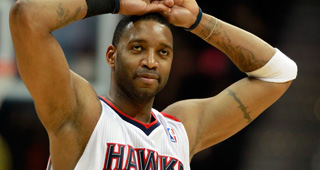The last time there was a lockout-shortened season, the Toronto Raptors were one of the NBA’s most promising young teams. With Vince Carter, a 6’6 shooting guard from North Carolina with unbelievable athleticism, and Tracy McGrady, a multi-dimensional 6’9 small forward who had emerged from obscurity as a high school lottery pick, they seemed like natural successors to the Chicago Bulls.
But instead of forming a dynasty in Toronto, McGrady and Carter bounced around the NBA, playing for nine different teams over the last 13 years. Yet, despite being written off by most of the basketball world, they are still productive players for playoff teams in 2012.
Most elite players have either an All-NBA level skill-set or All-NBA level athleticism; they had both. That’s why, long after their athleticism has eroded, they’re still able to be effective contributors.
McGrady, a 6’8 225 point forward with a 7’2 wingspan, a smooth three-point stroke and a massive vertical leap, was a more skilled and athletic version of Kevin Durant in Orlando. He averaged 32.1 points, 6.6 rebounds and 5.5 assists on 45.7% shooting in 2003, finishing with a 30.27 PER, the 14th highest mark all-time. Only six players have ever had better statistical seasons: Wilt Chamberlain, Michael Jordan, LeBron James, Shaquille O'Neal, David Robinson and Dwyane Wade.
Of course, for many, all that matters is the Magic’s first-round loss to the Detroit Pistons. After all, it’s perfectly reasonable to expect him to carry a starting line-up that also featured Drew Gooden, Jacques Vaughn, Gordon Giricek and Andrew DeClerq over the first of the great Pistons’ teams of the mid-2000’s.
In Houston, his body betrayed him, causing him to miss most of the 2009 and 2010 seasons with injuries. But unlike Brandon Roy and Grant Hill, McGrady’s injuries were perceived as a symbol of a larger character defect. So when he finally became healthy enough to play last year, the Pistons were the only team willing to sign him.
This year, he’s carved out a key role on the Atlanta Hawks bench, with per-36 minute averages of 13.4 points, 6.0 rebounds and 4.4 assists on 46% shooting. He’s only a year older than Caron Butler, yet Butler, who has a lower PER, is making $8 million this season while McGrady makes the league minimum. The main difference between the two is opportunity: Butler gets 15 field goal attempts and 32 minutes a game while McGrady gets five in 18 minutes. And while neither has the athleticism to be a great defender anymore, McGrady is a more efficient scorer and a far better playmaker.
Carter, meanwhile, has more than filled the void in Dallas left by Butler’s departure. He has occasionally turned back the clock with rim-rattling dunks, but he’s mostly been a post scorer and a facilitator for the Mavericks this season, with per-36 minute averages of 16.3 points, 4.8 rebounds and 3.9 assists on 45% shooting.
Very few players last more than a decade in the NBA; even fewer can still be effective members of a playoff team’s rotation in their 14th (Carter) and 15th (McGrady) seasons. Nor is this necessarily their last go-round either, as they’ve transformed their games to become role players in the same way that Ron Harper did for the late-90’s Bulls and Jason Kidd has done for the Mavericks.
Their careers will always be judged by their inability to lead a team to the Conference Finals, but they’ve both done more than enough to merit a Hall of Fame selection. McGrady, still only 32, made eight All-Star Games and has scored 18,276 points, putting him at No. 61 on the all-time scoring list. Carter, 35, made eight All-Star Games and has scored 20,804 points, No. 38 all-time.
The focus on team success is unfair to both, as big men, not perimeter players, usually decide championships. Until he came to Orlando in 2010, Carter had never played with an All-Star interior player. McGrady, meanwhile, spent most of his prime paired with Yao Ming, a big man with even worse injury luck, in Houston.
It’s hard to watch them without thinking about what could have been: if McGrady had stayed in Toronto, if Grant Hill hadn’t been hurt in Orlando, if Carter had been able to outlast Allen Iverson in their legendary 2001 second-round Game 7 shoot-out. But “what if” shouldn’t overshadow what actually happened, and if they steal a playoff game for the Mavericks or the Hawks this year, people shouldn’t be surprised.

Jonathan Tjarks wrote on the NBA for RealGM from 2011-2016 before joining The Ringer.
Follow @JonathanTjarks on Twitter.


